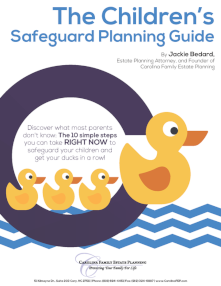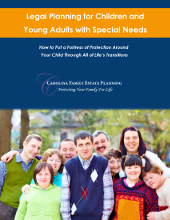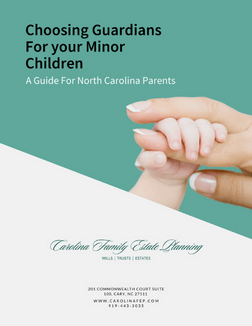As a parent, thinking about the possibility that a day could come when you cannot raise your child can be heartbreaking. But building a comprehensive estate plan to protect your minor child is one of the most important things you can do for them. But what do you do if you and your child's other parent are separated or divorced? Even if the relationship didn’t end harmoniously, for the sake of your child, it’s worth setting your differences aside temporarily to discuss these important issues.
Here are five major things to discuss with your ex:
-
Guardians
In the eyes of the law, if you pass away, even if you had full custody, guardianship of your child will pass automatically to your child’s other biological parent unless it is determined that the surviving parent is unfit or if the parent previously severed parental rights. Nonetheless, it is still prudent for both of you to nominate a few alternates in the event that both of you are not available. And it would give you and your child greater security and peace of mind about the future if you and your ex discussed and agreed on the same alternatives.
-
Emergencies
Nominating permanent guardians for your child is a great start, but also discuss emergency planning with your ex, especially if you live in different states. Our clients establish Children’s Safeguard Plans that, among other things, make sure we have nominated emergency temporary guardians that could care for the children in the event of an emergency and the permanent guardians are not available—friends, neighbors, or other family members that could respond within 20-30 minutes and care for the child. If you share custody with your ex, it’s important that both of you have emergency plans in place and that all of your children’s caregivers know what to do and who to call in the event of an emergency.
-
Family Visitation
If it’s important to you and your child, be sure to discuss with your ex the importance of extended family involvement in your child’s upbringing. For example, you should if you still want your parents actively involved in your child’s life even if your ex is the guardian. Within your estate plan, you may even provide instructions to your trustee that it is suitable to pay necessary travel expenses to ensure that such visitation is possible.
-
Inheritance
While you may feel that your ex could and should be your child’s guardian if something happens to you, if you’re like many divorcees, you do not want your ex to have control over any financial assets you leave behind for your child. So how can you leave your estate to your child without putting it in the hands of your ex? The key is to put your child’s inheritance in a trust and name a person that you know and trust as a trustee to manage the assets on your child’s behalf. Your trust can provide the trustee with instructions on how you want the assets managed, when and how to make distributions to your child’s guardian for the benefit of your child, and so on. Note that your trustee and guardian will have to communicate regularly and work together frequently, so if you and your ex can agree on a trustee that you both trust and are comfortable with it will make everyone’s lives easier.
-
Remarriage
It’s common upon remarriage to commingle assets and finances. And if you don’t properly plan for your child in your estate plan, it’s likely that if you die, all of your assets will end up going to your new spouse—effectively disinheriting your child. If you or your ex are contemplating remarriage, it’s essential to talk to your attorney and make sure there is a plan to ensure that your children will be provided for.
Need Help Establishing a Plan For Your Child(ren)?
If you need to establish a plan for your child(ren) or are unsure if you have the right plan in place, please contact our office at 919-443-3035 or visit our website to schedule a free needs assessment call with one of our friendly client welcome specialists.




